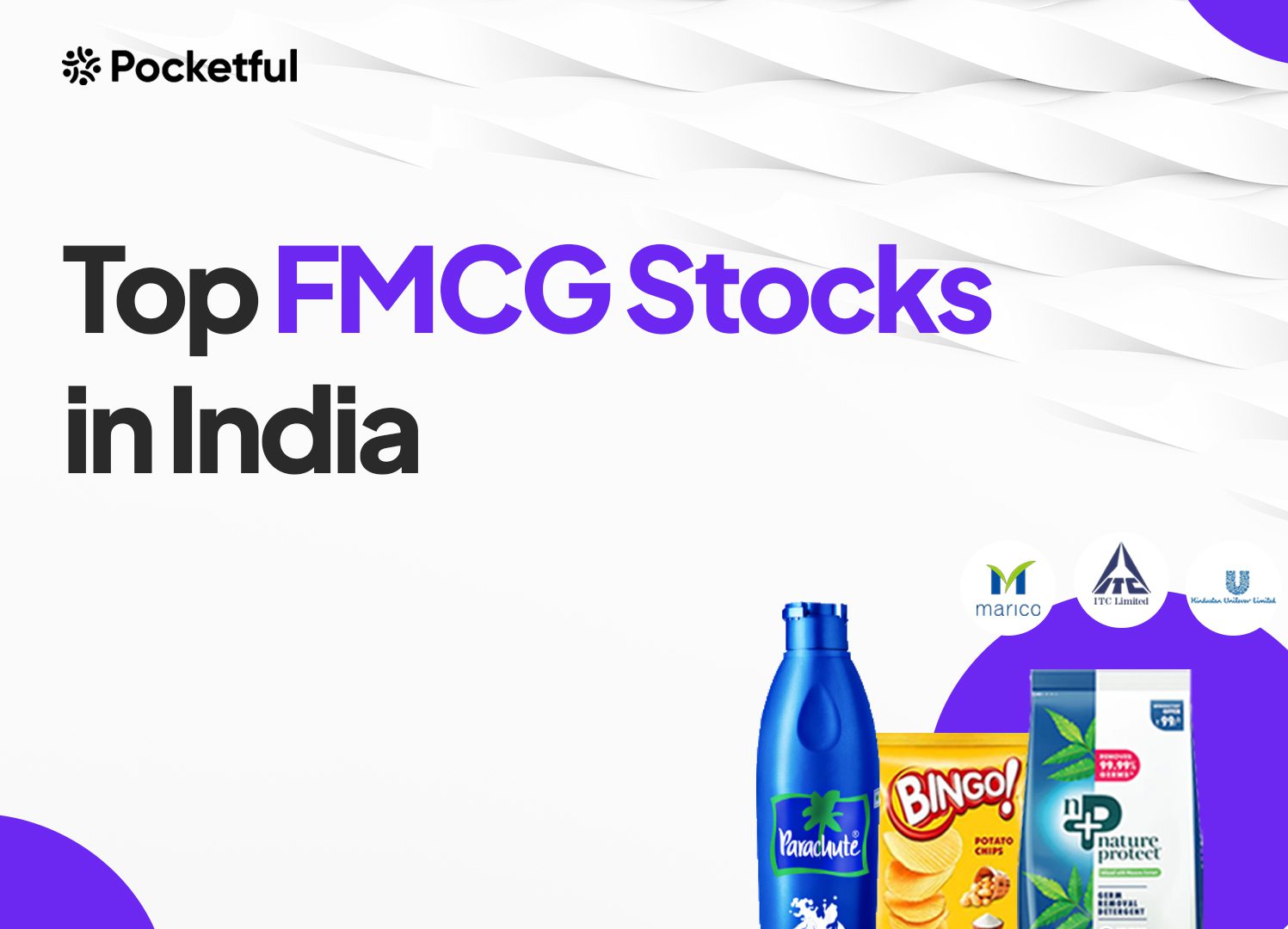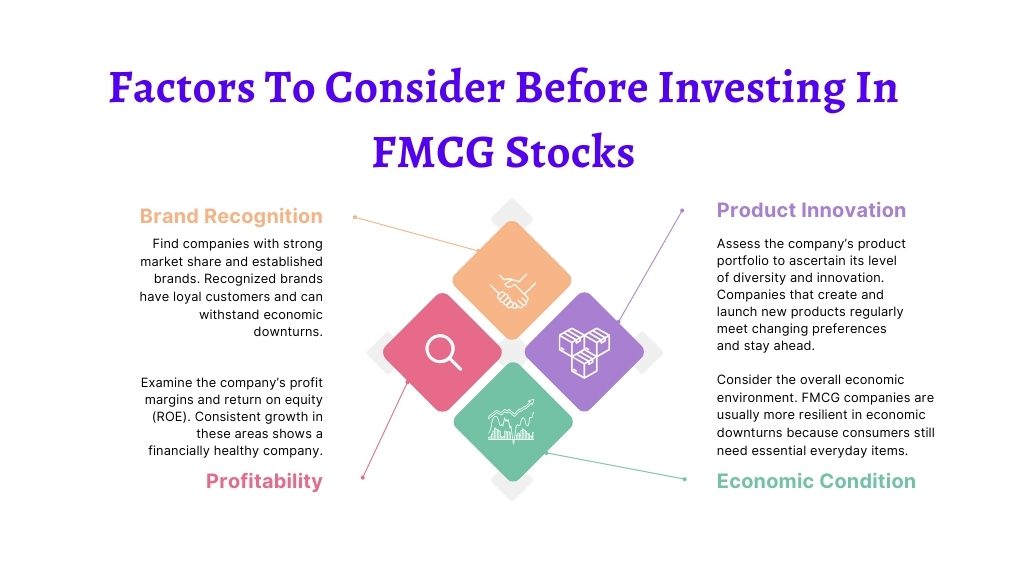| Type | Description | Contributor | Date |
|---|---|---|---|
| Post created | Pocketful Team | Jul-26-24 | |
| Add internal links | Nisha | Feb-15-25 |

- Blog
- best fmcg stocks in india
List Of Best FMCG Stocks In India 2025

Have you ever thought about what keeps your daily essentials wardrobe all stocked up? The answer lies in the Fast Moving Consumer Goods industry, a dominant force propelling the Indian economy. From the products you use daily to the delicious snacks you munch on, FMCG brands are intricately woven into the fabric of our daily lives. This multi-billion-dollar giant is experiencing explosive growth, particularly in rural India. For investors, identifying the best FMCG stocks in India can open doors to steady returns and portfolio diversification.
Today’s blog will explore some of the top FMCG stocks in India, their offerings, factors that should be considered before investing in FMCG stocks, and what the future holds for the entire FMCG sector.
Overview of the FMCG Industry
The FMCG industry refers to the industry that deals with products that are bought and consumed quickly and are priced relatively low. The FMCG market is valued at $615.87 billion by 2027, with a remarkable annual growth rate of 27.9%. The rapid expansion is fuelled by increased disposable income, particularly in rural regions. Household and personal care products account for a huge 50% of sales. Healthcare accounts for 31-32% of total spending, encompassing products such as OTC medicines and personal hygiene items.

Several factors are driving the growth of the FMCG sector, including the rising disposable income in India. As Indian consumers are earning more, their spending on consumer goods is also increasing. Lifestyle changes are also driving a surge in demand for premium products. Additionally, the rise of e-commerce has brought about a revolution in the way consumers shop. Online platforms offer a vast array of choices and unparalleled convenience, especially in rural areas where access to physical stores may be limited.
Top FMCG Stocks in India Based on Market Capitalization
The top FMCG stocks in 2025 are:
| S.No. | FMCG Stocks |
|---|---|
| 1 | Hindustan Unilever Ltd. |
| 2 | ITC Ltd. |
| 3 | Nestle Ltd. |
| 4 | Varun Beverages Ltd. |
| 5 | Godrej Consumer Ltd. |
The FMCG stocks have been listed in descending order based on their market capitalization in the table below:
| Company | Market Capitalisation (in INR crore) | Current Market Price(in INR) | 52 Weeks High | 52 Weeks Low |
|---|---|---|---|---|
| Hindustan Unilever Ltd. | 6,36,563 | 2,709 | 2,812 | 2,170 |
| ITC Ltd. | 6,12,048 | 490 | 511 | 399 |
| Nestle India Ltd. | 2,39,150 | 2,480 | 2,771 | 2,145 |
| Varun Beverages Ltd. | 2,14,578 | 1,651 | 1,674 | 792 |
| Godrej Consumer Products Ltd. | 1,51,106 | 1,477 | 1,525 | 960 |
Best FMCG Stocks in India 2025 – An Overview
The best FMCG stocks in India are given below, along with a brief overview:
1. Hindustan Unilever Ltd.
Hindustan Unilever was founded in the late 1980s. The Lever brothers, established by William Hesketh Lever, first entered the Indian market in 1888 with a product known as sunlight soap. However, the soap was marked with the phrase “Made in England by Lever Brothers.”
Hindustan Vanaspati Manufacturing Company, Unilever’s first Indian affiliate, was founded in 1931. Lever Brothers India Limited followed in 1933, and United Traders Limited followed in 1935. In 1956, these companies amalgamated to establish Hindustan Unilever Limited. The company’s headquarters is located in Mumbai.
Product Portfolio of the company is as follows,
- Home care products – Laundry detergents, fabric conditioners, dishwashing liquids, and toilet cleaners. (Surf Excel, Rin, Wheel).
- Personal care products – Soaps, shampoos, skin care products, hair care products, deodorants, oral care products.
- Beverages, packaged foods, water purifiers, healthcare products, baby soaps, shampoos, body lotions, cosmetic and beauty products.
| 1Y Return (%) | 3Y Return (%) | 5Y Return (%) |
|---|---|---|
| -2.11% | 3.13% | 3.13% |
2. Varun Beverages Ltd.
Varun Beverages Limited was established in 1995 by Ravi Jaipuria, the chairman of RJ Corp. The corporation first set up bottling facilities in India for PepsiCo products. Outside of the United States, VBL is the second-biggest PepsiCo beverage bottling company globally. In 2016, the company conducted its first initial public offering (IPO) to raise funds.
The company’s primary activities include bottle manufacture and distribution of PepsiCo’s product line, which includes bottled water, juices, and other non-carbonated drinks and carbonated soft drinks like Pepsi and Mountain Dew. The company and PepsiCo have a franchisee agreement that grants them the authority to manufacture and market PepsiCo beverages within their designated regions.
| 1Y Return (%) | 3Y Return (%) | 5Y Return (%) |
|---|---|---|
| -15.18% | 303.09% | 566.29% |
3. ITC Limited
ITC Limited is an Indian conglomerate headquartered in Kolkata, India. The company has a diversified presence across several industries, such as FMCG, hotels, packaging, etc. The company is considered a major player in the Indian economy and exports its products to over 90 countries, and is known for its commitment.
ITC holds a rich history that traces back to 1910 as the Imperial Tobacco Company of India Limited, a subsidiary of British American Tobacco. The company initially focused on tobacco products and established its first cigarette factory in Bangalore in 1913. The name of ITC was later changed to India Tobacco Company in 1970. The company continues to innovate and expand its FMCG portfolio while focusing on sustainability initiatives.
| 1Y Return (%) | 3Y Return (%) | 5Y Return (%) |
|---|---|---|
| -0.67% | 85.63% | 97.24% |
4. Nestle India Ltd.
Nestle is the world’s largest food and beverage company, with a rich history dating back to the 1980s. Henri Nestle, a German pharmacist, created ‘Farine Lactee’ to reduce the infant mortality rate, and the American Brothers founded the Anglo-Swiss company in 1866 and developed innovative milk products. Both companies succeeded with innovative milk products, targeting the urban population with changing lifestyles. In 1905, a merger formed the Nestle company we know today.
The company focuses on providing nutritious and convenient food and beverage products for customers of different ages and backgrounds. The company’s major products include infant formula, instant coffee, nutritional bars, frozen foods, etc.
| 1Y Return (%) | 3Y Return (%) | 5Y Return (%) |
|---|---|---|
| -11.99% | 24.27% | 33.79% |
5. Godrej Consumer Products Ltd.
Godrej Consumer Products Ltd. is a prominent Indian company established in 1897. Ardeshir Godrej started a lock company in 1897, laying the foundation for the Godrej Group for the Godrej Group. The consumer products business became a separate entity in 2001. The company has grown through strategic acquisitions like Keyline Brands (UK) in 2005 and hair care companies in South Africa.
It offers a wide range of good quality and affordable products across home care, personal care, and hair care segments. GPCL mainly generates revenue by selling FMCG products in different categories.
| 1Y Return (%) | 3Y Return (%) | 5Y Return (%) |
|---|---|---|
| -12.23% | 31.21% | 69.13% |
Read Also: List of Best Cosmetics Stocks in India
Top FMCG Stocks Based on 1-year Return
The top FMCG stocks in 2025 are:
| S.No. | FMCG Stocks |
|---|---|
| 1 | Varun Beverages Ltd. |
| 2 | Colgate Palmolive (India) Ltd. |
| 3 | Mrs Bectors Food Specialities Ltd. |
| 4 | Zydus Wellness Ltd. |
| 5 | Bikaji Foods International Ltd. |
The FMCG stocks have been listed in descending order based on their 1-year returns in the table below:
| Company | 1-Year Returns |
|---|---|
| Varun Beverages Ltd. | 105.72% |
| Colgate Palmolive (India) Ltd. | 65.87% |
| Mrs Bectors Food Specialities Ltd. | 62.41% |
| Zydus Wellness Ltd. | 61.88% |
| Bikaji Foods International Ltd. | 45.65% |
Best FMCG Stocks in India 2025 based on 1-Year Return – An Overview
The best FMCG stocks according to 1-year return are given below, along with a brief overview of the services they provide:
1. Colgate Palmolive
Colgate Palmolive, known for toothpaste, has a long and interesting history since the early 19th century. William Colgate started a new business in New York in 1806. In the 1870s, the company introduced its first toothpaste. In 1896, Colgate launched the first toothpaste in a tube. It was merged with Palmolive-Peet in 1928. Today, Colgate-Palmolive is a multinational corporation known for its oral care products.
The company holds some trusted brands like Ajax and Hill’s Science Diet, offering products in oral care, personal care, home care, and pet nutrition. The products are available in over 200 countries. It also invests in research and development to create new products for the ever-changing demands of the consumer. With a presence in over 200 countries, Colgate Palmolive products have become a well-known choice for consumers around the globe.
| 1Y Return (%) | 3Y Return (%) | 5Y Return (%) |
|---|---|---|
| -4.52% | 75.44% | 84.25% |
2. Mrs Bectors Food Specialities Ltd.
Mrs Bectors Food Specialities Ltd In the 1970s, Mrs. Rajni Bector started making homemade treats and established Mrs. Bector’s Foods with her husband’s support. Her incredible baking skills quickly earned her a well-deserved local reputation for crafting mouth-watering homemade treats such as ice creams, puddings, cakes, cookies, and buns. Later, her husband set up a small manufacturing unit, marking the beginning of Mrs. Bector’s Food.
The company manufactures and sells bakery and frozen products like buns, pizzas, kulchas, and cakes to several businesses in India. It also sells products such as ‘Mrs. Bector’s Cremica’ and ‘English Oven’ apart from its domestic biscuits business.
| 1Y Return (%) | 3Y Return (%) | 5Y Return (%) |
|---|---|---|
| 29.77% | 292.85% | 171.85% |
3. Zydus Wellness Ltd.
Zydus Wellness began its operations in 1988 with the introduction of Sugar-Free, India’s first zero-calorie sugar substitute. This marked the beginning of a transformative journey that would position the company as a leader in consumer wellness. Originally operating as Carnation Nutra-Analogue Foods, the company focused on dairy substitutes and margarine products. The turning point came in 2006 when Cadila Healthcare acquired a significant stake in the company. In 2009, Cadila’s consumer goods business merged with Carnation Nutra Foods to create Zydus Wellness.
The company holds a strong portfolio that showcases a robust collection of renowned brands such as Sugar-Free, Glucon-D, Complan, Everyuth, and Nycil. These brands have cultivated a profound sense of trust and loyalty among customers.
| 1Y Return (%) | 3Y Return (%) | 5Y Return (%) |
|---|---|---|
| 5.69% | 13.10% | 12.42% |
4. Bikaji Foods International Ltd.
The history of Bikaji Foods International can be traced back to the late 1980s. It was founded by Shivratan Agarwal. The company was originally named Shivdeep Industries Limited, which was incorporated in 1986. It subsequently changed its name to Bikaji Foods International in 2016.
Bikaji Foods International Limited is a major Indian snack food company and one of the largest fast-moving consumer goods (FMCG) brands in India. The company manufactures a wide variety of snacks across various categories. Bikaji is the third largest ethnic snacks company in India and the largest manufacturer of Bikaneri Bhujia. Their products are popular in India and are exported to over 25 countries, including North America, Asia Pacific, the Middle East, the European Union, Africa, and the United Kingdom.
| 1Y Return (%) | 3Y Return (%) | 5Y Return (%) |
|---|---|---|
| 9.22% | 78.98% | 78.98% |
Note: The overview of Varun Beverages Ltd. is in the overview section of FMCG companies based on market capitalization.
Key Performance Indicators (KPIs) of FMCG Stocks
| Company | ROE (%) | ROCE (%) | Debt to Equity | P/E(x) | P/B(x) |
|---|---|---|---|---|---|
| Hindustan Unilever Ltd. | 20.06 | 21.72 | 0 | 61.56 | 12.42 |
| ITC Ltd. | 27.45 | 34.76 | 0 | 29.93 | 8.22 |
| Nestle India Ltd. | 117.71 | 82.68 | 0.01 | 74.83 | 71.6 |
| Varun Beverages Ltd. | 29.64 | 27.26 | 0.75 | 99.23 | 30.95 |
| Godrej Consumer Products Ltd. | -4.44 | 23.02 | 0.25 | -270.09 | 12.02 |
| Colgate Palmolive (India) Ltd. | 70.61 | 92.26 | 0 | 64.77 | 45.70 |
| Mrs Bectors Food Specialities Ltd. | 21.17 | 23.38 | 0.34 | 66.83 | 13.48 |
| Zydus Wellness Ltd. | 4.98 | 5.54 | 0.06 | 56.78 | 2.83 |
| Bikaji Foods International Ltd. | 22 | 27.64 | 0.07 | 65.64 | 14.53 |
Read Also: List Of Best Textile Stocks in India
Benefits of Investing in the FMCG Stocks
The benefits of investing in FMCG stocks are:
- FMCG stocks provide portfolio diversification as they are stable businesses.
- Investors get a consistent dividend income.
- These stocks are preferred by investors who don’t want to take excessive risks.
Factors to Consider Before Investing in FMCG Stocks

Investors must consider the following factors before investing in FMCG stocks:
- Brand Recognition – Find companies with strong market share and established brands. Recognized brands have loyal customers and can withstand economic downturns.
- Product Innovation – Assess the company’s product portfolio to ascertain its level of diversity and innovation. Companies that create and launch new products regularly meet changing preferences and stay ahead.
- Profitability – Examine the company’s profit margins and return on equity (ROE). Consistent growth in these areas shows a financially healthy company.
- Economic Condition – Consider the overall economic environment. FMCG companies are usually more resilient in economic downturns because consumers still need essential everyday items.
Future of the FMCG Industry
The future of the FMCG industry looks bright due to the following factors:
- Rising Disposable Income – Due to rising incomes, especially in developing markets, will lead to higher demand for a variety of consumer goods.
- E-commerce Penetration – E-commerce is rapidly growing, which will help FMCG companies increase their customer base and revenues.
- Sustainability – Consumers prefer companies that prioritize eco-friendly practices, such as using sustainable packaging and production methods.
Overall, the FMCG sector is poised for growth in the future and is expected to remain a good investment option. However, it is important to analyze the market trends of individual companies before investing your money.
Read Also: List of Best Cosmetics Stocks in India
Conclusion
The FMCG sector presents an exciting opportunity marked by consistent growth, strong brand loyalty, and the potential for significant returns. Investors can find good opportunities by evaluating a company’s strengths, financial performance, and industry trends. Do thorough research or seek advice from a financial advisor before investing.
Frequently Asked Questions (FAQs)
Why invest in FMCG stocks?
FMCG stocks are generally considered a defensive investment option because customer’s demand for these goods remains relatively stable even during economic downturns.
What are the risks involved in FMCG stocks?
Factors like rising input costs, intense competition, and changing consumer preferences can affect the performance of these stocks.
How to select FMCG stocks for investing?
When choosing FMCG stocks, you can look for factors like market share, product portfolio, and past financial performance.
Are FMCG stocks good for long-term investment?
Historically, these stocks have delivered consistent returns over the long term, but it is important to do proper research before investing.
Do FMCG stocks provide dividends?
Many FMCG companies have a history of paying regular dividends.
Disclaimer
The securities, funds, and strategies discussed in this blog are provided for informational purposes only. They do not represent endorsements or recommendations. Investors should conduct their own research and seek professional advice before making any investment decisions.